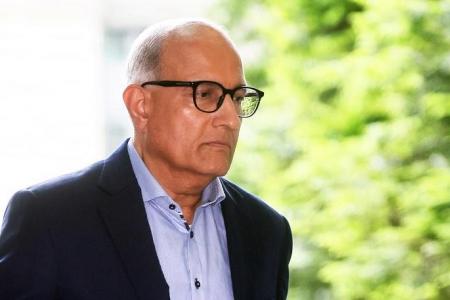Why was S. Iswaran handed a one-year jail sentence?
In a surprise decision, former Transport Minister S. Iswaran was handed a one-year jail sentence on Oct 3. This exceeded the requests of both prosecution and defence, which Justice Vincent Hoong described as “manifestly inadequate.”
Deputy Attorney-General (DAG) Tai Wei Shyong had asked for six to seven months’ jail, while Iswaran’s lawyer, Davinder Singh, had argued for no more than eight weeks.
Iswaran, 62, had on Sept 24 admitted to one charge of obstruction of justice and four charges under Section 165 of the Penal Code, which forbids all public servants from obtaining any valuable thing from someone involved with them in an official capacity.
The Straits Times highlights the key points of Justice Hoong’s judgement.
General deterrence a key consideration
Rejecting the defence’s argument, Justice Hoong said that general deterrence, aimed at setting an example for others who commit offences, should be the primary consideration in his sentencing decision.
“I agree with the prosecution that the higher the office held by the offender as a public servant, the higher his level of culpability,” said Justice Hoong in his judgment.
“Such persons set the tone of public servants in conducting themselves in accordance with high standards of integrity, and must be expected to avoid any perception that they are susceptible to influence to pecuniary benefits,” he said.
Iswaran’s roles as a minister and chairman of the F1 steering committee then wielded influence in matters of great public interest, even if there is no evidence the gifts had influenced decisions over F1 or its contracts, the judge said.
Trust in public institutions damaged
Justice Hoong said significant harm was caused to the trust in the public office.
He said the mere perception that the receiver is under the influence of the giver, who is cultivating goodwill, is already harmful to trust in public institutions.
Justice Hoong said that the awareness of the giver’s motive is relevant to sentencing, especially when the public servant knows the giver is motivated by a desire to cultivate goodwill or loyalty.
Iswaran’s public service and contributions to Singapore are, at best, a neutral factor given the need for deterrence, said Justice Hoong.
The judge noted that his voluntary return of the benefits is unlikely to undo the harm done to the public interest.
Iswaran acted with deliberation
Justice Hoong listed the ways Iswaran had acted with deliberation in obtaining gifts.
Iswaran had taken urgent personal leave for the trip to Doha with businessman Ong Beng Seng, allowing him to enjoy an all-expenses-paid trip with only four days’ prior notice, Justice Hoong said.
While the defence argued that Mr Ong had given Iswaran gifts in the context of friendship, the judge disagreed and said that the former transport minister had abused his position by obtaining gifts despite knowing Mr Ong’s close connection to his duties. This increased his culpability, Justice Hoong said.
When Iswaran became aware that the Corrupt Practices Investigation Bureau was investigating Mr Ong’s associates, it was Iswaran who requested that Mr Ong bill him for his flight to Doha, Justice Hoong said.
By asking to be billed and paying for the ticket, he was attempting to avoid investigations into the gifts, he added.
While the defence argued that Iswaran did not sell his Formula 1 Green Room tickets and instead distributed them to family and friends, it ignores the fact that the tickets would have otherwise been distributed for free by the Singapore Grand Prix, Justice Hoong said.
Not remorseful
Iswaran only expressed remorse at a late stage of proceedings, the judge said, adding that he did not believe that Iswaran was remorseful.
Iswaran had earlier pleaded guilty to five offences on the first day of what was supposed to be his criminal trial on Sept 24, after saying for months he would be contesting the case to clear his name.
Justice Hoong said in his sentencing: “The accused had simultaneously made public statements rejecting the allegations in the charges as false and asserting his innocence.”
He cited Iswaran’s letter to then-Prime Minister Lee Hsien Loong. “(Iswaran) stated that he rejected the charges and was innocent and expressed his strong belief that he would be acquitted,” said the judge, adding: “Thus, I have considerable difficulty accepting that these acts were indicative of the accused’s remorse and desire to make reparations.”
“In my view,” said Justice Hoong, “the accused, having made tactical choices which he did at the initial stages of the proceedings, must stand by the consequences of those choices.”
The rest of the 30 charges taken into consideration reveal the scale and repetition of Iswaran’s offending over a significant period of time, increasing his culpability, the judge added.
Iswaran is due to surrender himself on Oct 7 at the State Courts.
Get The New Paper on your phone with the free TNP app. Download from the Apple App Store or Google Play Store now


